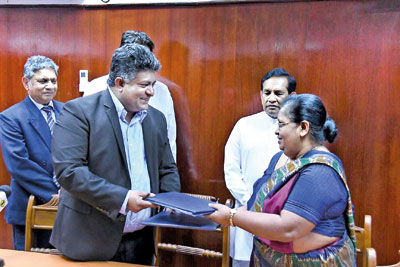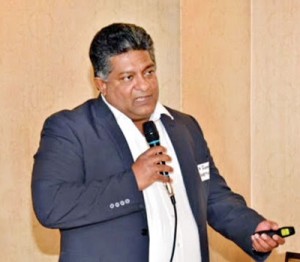News
Sri Lanka’s first Palliative Care Hospital to come up in Anuradhapura
A two-acre property in Anuradhapura will be the location of Sri Lanka’s first Palliative Care Hospital which will be completed by end 2019 as a collaboration between the Health Ministry and Shanthi Foundation, a registered charity.

Signing of the MoU lasat year
The MoU was signed between the parties in August last year and Cabinet approval was given this week for the project which will cater to the growing number of patients requiring palliative care.
Construction work on the hospital–the brainchild of Dr. Suharsha Kanathigoda, a Senior Consultant in Palliative Care attached to the Australian National University and Chairman and Founder of the Shanthi Foundation– will begin in a few months time on the two-acre property in Viharapalugama Road, five km from the Anuradhapura Hospital.
During a brief visit to Colombo this week, to finalise the ‘Service Agreement’ with the Health Ministry, Dr. Kanathigoda said that the construction process will be in three phases, entailing an investment of nearly Rs. 400 million. While the total cost of the construction, design of the hospital and training of the clinical staff will be borne by Shanthi Foundation, the Health Ministry will be responsible for the salaries of the staff and the cost of medicine.
“While our project architect will be designing the hospital free of charge, we will be going through a transparent tender procedure for the procurement of a local contractor for the construction. We will aslo have solar power and rain water harvesting to make the facility an eco-friendly one,” Dr. Kanathigoda told the Sunday Times.
He said the foundation will monitor the non-clinical management of the hospital for at least 20 years once it is completed. The facilities will include an in-patient bed strength of 40, outpatient clinics and home-based palliative care services.

Dr. Suharsha Kanathigoda
The hospital, the first of its kind in the country, which will also serve as a centre of research in palliative care and Chronic Kidney Disease of Unknown Origin (CKDu) will also enable training opportunities for the staff both locally and in Australia.
The need for palliative care in the country, he reiterated, cannot be underminned, with figures indicating around 60% of deaths in the country annually. At present formal palliative care services are not available except in a few hospitals which function largely as residential facilities for patients undergoing radiotherapy or chemotherapy. As Dr. Kanathigoda points out, more awareness on palliative care should be raised, not only among the local clinical fraternity but also among the people and political establishment.
“This is what we aspire to through the hospital in Anuradhapura and it is heartening to note that the first batch of diploma holders in palliative care from the Post Graduate Institute of Medicine (PGIM) are now being trained,” said the Consultant who moots an MBA programme to enable a career path for potential palliative care consultants in the country.
Dr. Kanathigoda has been working closely with Govt. institutions, since 2011, including the Health Ministry, the Prime Minister’s Office and the President’s Task Force on CKDu and in the areas of capacity building and training in palliative care. “As a product of Sri Lanka’s free education, first at Royal College Colombo and later at the Colombo Medical Faculty, I was looking at opportunities to give back to my country, which had given me so much, and this seemed to be the ideal opportunity,” said the Consultant.
With considerable Australian experience to his credit, Dr. Kanathigoda has also initiated renal palliative care in India and is soon to expand the reach of the Foundation to Thailand, China and Indonesia where there is an acute need for the service. Apart from palliative care, the Foundation had been active locally through various projects including the ‘Clean Water For Life Project’ for school children and the communities in CKDu affected areas, Organic Kenda Programme in Kekirawa Central School, Equipment Donation Programme among Cancer and CKDu units throughout the country and a free home based palliative care service in rural settings.
More information about the project can be obtained at www.shanthi-foundation.org.

